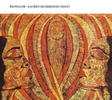
When I reviewed Bionulor’s debut release a bit less than two years ago, I complimented his conceptual use of "sound recycling," but felt the compositions lacked focus and structure. On this sophomore release, Sebastian Banaszczyk has definitely stepped up his game, and the results are quite satisfying
Thematically linked by using the human voice as a sound source, each of the five pieces here pull that element from widely varying contexts and then use it completely differently.For example, "Nhn-B." decimates a traditional Japanese song into what at first has a sparse, spacey vibe to it, but soon degenerates into a tortured chorus screaming through reverb hell, shattering the open calm.
"NL.," built upon Neal Armstrong’s famous recording from walking on the moon, initially allows its pedigree to come forth, with clipped voices and radio static overtly opening the piece from near silence.After these initially violent outbursts, the voices disappear, leaving only their minute traces to be heard, which Banaszczyk shapes into dramatic, almost prog rock swells that expand for infinity, much like the vastness Armstrong was witnessing as he made his statement.
Based upon an interview with Marcel Duchamp, "Dchmp." allows its source material to be heard at first, but is deconstructed into a high pitched squeal and little squirty outbursts of noise that come and go with reckless abandon.While the outro develops into more conventional "noise" territory, it is the most idiosyncratic piece, and also the most memorable, with its odd organic blasts of noise sounding like no one else.
"Nic Nie Jest Prawdziwe" features Banaszczyk himself, reading the infamous "Nothing is true" quote from Hassan-i Sabbah.Taking a more conventional approach of allowing his looped voice to be slowly disintegrated by effects, it first is mired in the expected echoes, reverbs, and delays, but is then disemboweled into fragments of phonemes, cut into stuttering beats or pulled apart into pure static, leaving nothing of its original nature to be heard.
The only misstep is the long opening "Scrd. Mshrm. Chnt.," because, throughout its nearly 22 minute duration, there is simply too much of a collage feel to it, and the piece never feels like it truly gets its footing.It is a compelling collection of percussive clicks, varying textures and alternating loud and quiet dynamics, but it lacks the clear compositional structure of the other pieces.
Bionulor has demonstrated some significant growth in both his style and compositions since his first album, and he is doing well carving out his own niche in a relatively crowded genre.
samples:
 
Read More

